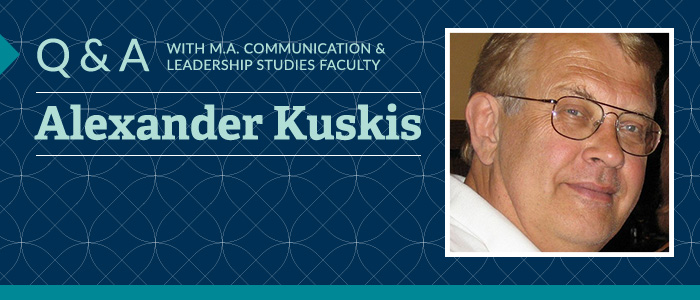The faculty in the M.A. in Communication & Leadership Studies program are leaders in the field of communication. Their contributions advance the way communication is understood, taught, and used in a rapidly changing world. Our award-winning faculty are at the top of their field and their areas of expertise span the spectrum of communication disciplines.
In the Jesuit tradition of cura personalis, the COML faculty are committed to the intellectual development and success of students both in and outside of the classroom. More than imparting knowledge for knowledge’s sake, our faculty embrace the Ignatian mission to impart knowledge for the sake of the betterment of community.
ALEXANDER KUSKIS
PhD, MEd (Education, U of Toronto), MA (Drama, U of Toronto), BA (English, U of Western Ontario); Diplomas & Certificates: Computer Programming, Business, Adult Education, Online Learning
Biography
Dr. Alex Kuskis was born in Czechoslovakia of Latvian parents and immigrated to Canada at the age of 4. He has divided his career equally between education and business. Holding a BA in English from the University of Western Ontario, and an MA in Dramatic Literature & Theatre History from the University of Toronto, more recently he completed MEd and PhD degrees in Educational Computing & Online Learning at the Ontario Institute for Studies in Education (OISE), University of Toronto. He has held management positions in book publishing for such firms as Penguin, Holt, Rinehart & Winston & John Wiley, as well as IT and computer training companies. With teaching stints at the Universities of Toronto, Manitoba (where he also directed student theatre) and Wilfrid Laurier University, he has taught online for Connected University and Royal Roads University. He has also held academic administration positions at DeVry Institute of Technology, the Institute for Computer Studies, and the University of Guelph. Now preferring to teach courses online, he occasionally accepts assignments as an e-learning consultant.
His academic interests include media ecology, the media work of Marshall McLuhan and the Toronto School of Communication, digital media & culture, computer-mediated communication, and communication history. He publishes the McLuhan Galaxy blog (https://mcluhangalaxy.wordpress.com/ ), selected by the Marshall McLuhan Estate as their official blog, is on the Executive Board of the Media Ecology Association, and is the Pedagogy Editor of its academic journal, Explorations in Media Ecology.
His research interests include communication & media theory, media ecology, Internet studies, educational media, e-learning, and Marshall McLuhan. Dr. Kuskis is currently writing a book on Marshall McLuhan as a learning theorist.
Q & A with Dr. Alex Kuskis
Q: How long have you been teaching for the COML program?
A: From the very beginning, or close to the beginning, of the program. As far as I can establish from my records, my first course was COML 509, Fall A1 2006. Since then I have taught COML 509 34 times and COML 508 14 times.
Q: What area in the discipline of communication are you most passionate about/is your expertise in?
I am passionate about the field of Media Ecology, which can be defined as the study of media environments and the effects of media on the world, the idea that technology and techniques, modes of information and codes of communication play a leading role in human affairs.
Q: What is the project/publication/professional accomplishment you are most proud of?
The two awards I was awarded by the Media Ecology Association:
- The Louis Forsdale Award for Outstanding Educator in the Field of Media Ecology (2011)
- The John Culkin Award for Outstanding Praxis in the Field of Media Ecology (2015) for publishing the McLuhan Galaxy blog since 2010.
Q: What project are you currently working on?
A: I am working on a book tentatively titled Marshall McLuhan as Educationist: Institutional Learning in the Age of Post-Literacy. Marshall McLuhan is best known as the father of media studies and prophet of the information age, less known as an English literature professor and literary scholar and scarcely recognized at all as an educationist or educational theorist. I hope to change that.
Q: What things should we be thinking about in the field of communication? Notable trends?
A: We are in the midst of the most radical media transition since Gutenberg, with the Internet and digital media disrupting and transforming just about every area of human endeavor; we need theories and tools of media analysis and literacy to understand what is happening to us and our world, so that we teach students how to use digital media without being used by it, so they can survive and thrive.
Q: How does the COML program and GU differ from other programs and schools that you teach for?
For mid-career professionals, or even entry level ones, the combination of intensively studying Communication and Leadership can better equip learners with the skills needed to advance in their careers, whether these be in business, education, the military, or any other form of organizational work. Communication skills have never been more important.
Q: What book are you reading right now?
A: The Shallows: What the Internet is Doing to Our Brains (2010) by Nicholas Carr, who gave the keynote lecture at our 2015 MEA convention in Denver.
